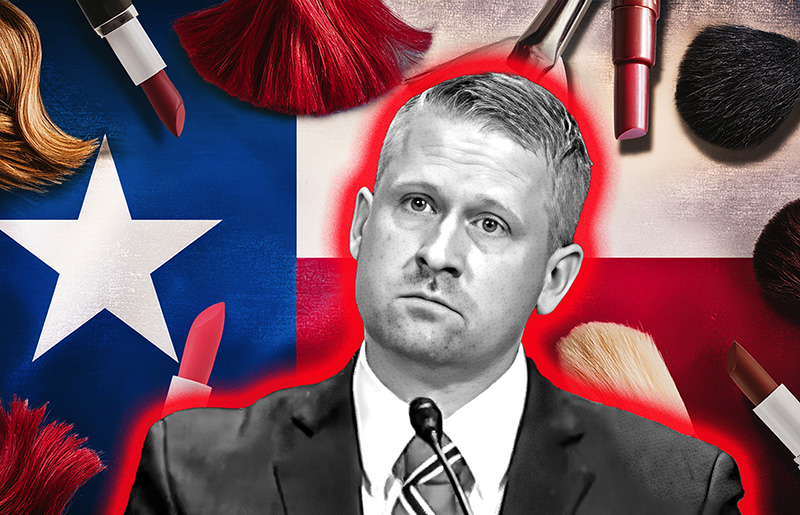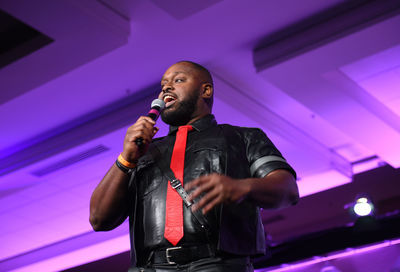Florida House passes heinous “Don’t Say Gay” bill
Lead sponsor withdrew amendment to force teachers to notify parents of their child's LGBTQ identity within 6 weeks.
By John Riley on February 24, 2022 @JRileyMW

The Florida House of Representatives passed a controversial bill that seeks to prohibit classroom discussion about sexual orientation or gender identity in primary grades.
The so-called “Parental Rights in Education” bill, dubbed the “Don’t Say Gay” bill by critics, passed the Republican-led House by a 69-47 margin. It now heads to the Republican-led Senate, where it is expected to pass, and then to the desk of Gov. Ron DeSantis (R), who has previously signaled his support for the bill.
Under the bill, sponsored by Rep. Joe Harding (R-Williston), teachers would be prohibited from “encouraging discussion” about sexual orientation or gender identity in primary grade levels — which in Florida, is defined as preschool through third grade — or broaching the topic “in a manner that is not age-appropriate or developmentally appropriate for students.” The bill also allows parents to sue school districts for failing to consult them regarding “critical decisions affecting a student’s mental, emotional, or physical health or well-being.”
While supporters largely intend for the bill to discourage teachers from affirming a child’s gender identity or acknowledging sexual orientation without first consulting the parents, during a Senate hearing on a nearly-identical bill proposed by Sen. Dennis Baxley (R-Belleview), Baxley refused to answer a question about whether the bill could enable schools to be sued by overly litigious parents or those seeking an easy “cash-grab,” for even the smallest of reasons, such as providing, at the child’s request, a vegetarian lunch option in the cafeteria if the parents are not alerted beforehand.
Instead, Baxley said he didn’t think the bill would lead to an “enormous amount of lawsuits” and would be seen as a blessing by teachers who “know they’re not responsible to deal with every issue in life.”
Additionally, both versions of the bill are vague about what constitutes “age-appropriate or developmentally appropriate,” failing to clarify at which age or grade level students LGBTQ-related issues may be broached, if at all. Supporters, including the GOP LGBTQ group Log Cabin Republicans, say critics are intentionally misrepresenting the bill’s intent, which is to shield young children from controversial or confusing topics on gender and sexuality before they are old enough to comprehend them.
Harding, the House sponsor, said the measure is all about “empowering parents” to be kept abreast of what is going on in their children’s schools, reports NBC News.
“Creating boundaries at an early age of what is appropriate in our schools, when we are funding our schools, is not hate,” Harding said. “It’s actually providing boundaries, and it’s fair to our teachers and our school districts to know what we expect.”
When questioned about his bill, Harding has repeatedly stressed that the bill would not censor the free speech of students who raise LGBTQ topics without being prompted by a teacher — as in the case of a first-grader who talks about growing up in a household with same-sex parents — or ban discussions about or mentions of LGBTQ history, such as the 2016 attack on the Pulse nightclub in Orlando.
But critics of the bill are skeptical, claiming the bill’s overly broad and vague language will lead to lawsuits from parents who believe any mention of LGBTQ-related issues in schools is inappropriate, even in secondary grades. As such, they claim that, in practice, regardless of what the actual law says, overzealous administrators — especially those seeking promotions or higher-level jobs — and classroom teachers will proactively censor any mentions of LGBTQ content, even at the middle and high school level.
Critics also contend that fear will create a toxic environment where teachers, feeling unsupported by administrators and parents, may preemptively excise references to homosexuality from biology, sex ed, and family life classes; avoid lessons on LGBTQ historical figures altogether or scrub mentions of their LGBTQ identities; and even refuse to intervene to stop bullying of LGBTQ students, lest they be accused of “promoting” homosexuality — all to placate the most hypersensitive of socially conservative parents at a particular school.
“Anybody who says that this bill is only about kindergarten through third grade is either mistaken or flat out lying,” Rep. Michael Grieco (D-Miami Beach) told fellow lawmakers during debate on the House floor.
LGBTQ advocates have also noted that Harding introduced — and later withdrew, after negative public backlash — an amendment that would have required school officials to inform parents of their child’s sexual orientation or gender-nonconformity within six weeks after the student discloses such information.
According to its text, the amendment would have required administrators and teachers to “develop a plan, using all available governmental resources, to disclose such information,” facilitating “open dialogue in a safe, supportive, and judgment-free environment that respects the parent-child relationship and protects the mental, emotional, and physical well-being of the student.”
But just prior to the House voting on the measure, Harding withdrew the amendment, telling the Tallahassee Democrat it was serving as a distraction to the larger bill. He claimed that “the exaggeration and misrepresentation in reporting about the amendment was a distraction; all the amendment did was create procedures around how, when and how long information was withheld from parents so that there was a clear process and kids knew what to expect.”
“Nothing in the amendment was about outing a student,” he said. “Rather than battle misinformation related to the amendment, I decided to focus on the primary bill that empowers parents to be engaged in their children’s lives.

But LGBTQ advocates and allies said the amendment flew in the face of one of the original bill’s provisions allowing teachers to refrain from “outing” LGBTQ students if they believe such a disclosure will lead to the abuse, neglect, abandonment, or, in the most severe cases, death of the child in question. They also pointed to the very nature of the “disclosure” amendment as evidence that the bill’s intent is not so much about parental rights as it is about erasing LGBTQ identity.
“The bill presupposes that LGBTQ people are not human beings,” Randi Weingarten, the president of the American Federation of Teachers and an opponent of the bill, told Metro Weekly. “The framing of this bill presupposes that there’s something wrong or something sexual about simply being LGBTQ, as opposed to ‘LGBTQ is an identifying characteristic of a human being.’
“What if somebody was saying, ‘Well, don’t talk about someone who is Jewish, unless it’s age-appropriate, or Roman Catholic, unless it’s age-appropriate’ and I could go on and on,” added Weingarten. “If anybody said that about some other defining characteristic of a family, people of goodwill would be crying bloody murder. This is about our families, and whether we accept families who are different. It’s intended to be a cultural wedge-issue, it’s intended to create more factionalism, it’s intended to create more tribalism, and it’s intended to create fear of the ‘other.'”
Weingarten said that the “heinous” bill, and its proposed amendments, send a message, not only to LGBTQ youth, but heterosexual youth with LGBTQ relatives, that they have to hide their identity or a refuse to acknowledge parts of their family, or risk not receiving support from their schools — and, for those LGBTQ youth who are not open about or are concealing their identity, that school administrators will only “out” them.
“This has nothing to do with sex. It has everything to do with dehumanizing people who are different,” she said.
Other advocates raised concerns about the bill’s impact on the mental well-being of youth who are either LGBTQ or from LGBTQ families.
A 2021 national survey by The Trevor Project, an LGBTQ youth suicide prevention and crisis intervention group, found that 42% of LGBTQ teens and young adults seriously considered attempting suicide in the past year, including more than half transgender and nonbinary youth. However, a separate survey from 2020 found that LGBTQ youths who reported having at least one LGBTQ-affirming space in their lives had lower rates of attempting suicide. And a third research brief by the organization released last year found that youth who learned about LGBTQ issues or people in school had 23% lower odds of attempting suicide in the past year.
A recent poll conducted by Morning Consult on behalf of The Trevor Project found that 85% of transgender and nonbinary youth — and two-thirds of LGBTQ youth overall — in the United States said recent debates over laws restricting LGBTQ rights or equal access have negatively impacted their mental health.
“This bill would heavily endanger LGBTQ youth. It would endanger their physical health through physical violence and bullying, it would endanger their mental health through depression, anxiety and potentially even increase the rate of suicide,” Andrea Barrica, a sex education advocate and founder of O.school, an online sexual education forum, told Metro Weekly. “Because when you stigmatize something, you are implying that there is something wrong or something, not right or not ‘normal.’ And children need more presentations that LGBTQ identities are normal, that they’re a part of everyday life.
“I have seen and I have heard lived experiences of students who have been outed and have become homeless and have lost major opportunities in their lives because of other people’s perception of their sexuality,” Barrica added.
“I think there is a lot of discussion about parents rights to control what their children are or are exposed to. But what we need to focus on is the safety and public health of youth,” she said. “And a lot of this stems from fear and the fact that many parents have not received sex education themselves. … We need to acknowledge that most people in the U.S. today didn’t receive this type of education about gender and sexuality. And while we can understand that that can be hard for them, it does not mean that we should put their comfort level over the safety of youth, because youth need and deserve a right and a voice in this country.”
More from Metro Weekly:
Texas Judge Upholds Campus Drag Ban, Likens it to “Blackface”
The decision marks a major defeat for student organizers who sought a permanent injunction against the university’s 2023 policy.
By John Riley on January 22, 2026 @JRileyMW
A federal judge who routinely sides with conservative activists has upheld West Texas A&M University’s ban on campus drag performances, ignoring long-standing precedent and rejecting First Amendment arguments for why the prohibition should be overturned.
West Texas A&M University imposed the ban in 2023, when University President Walter Wendler barred Spectrum WT, the college's LGBTQ student organization, from hosting a campus drag show to raise money for The Trevor Project, the nation's leading LGBTQ suicide prevention organization.
Wendler blocked the show on the grounds that drag is "misogynistic" and mocks women, comparing the art form to blackface. He also maintained there is no such thing as a "harmless drag show," arguing that performers adopt exaggerated gender expressions through makeup, clothing, and prosthetics that stereotype and insult women.
MacKenzie Scott Donates $45 Million to The Trevor Project
The historic gift comes as the LGBTQ youth crisis nonprofit faces staffing shortages and the loss of federal 988 funding.
By John Riley on January 14, 2026 @JRileyMW
Philanthropist MacKenzie Scott has donated $45 million to The Trevor Project, marking the largest gift in the LGBTQ youth crisis organization’s history.
Scott, the ex-wife of Amazon founder Jeff Bezos, gives away millions of dollars each year to nonprofit organizations focused on education, climate change, environmental protection, racial and social justice, and LGBTQ rights.
According to Forbes, Scott’s 2025 philanthropy brought her total lifetime giving to $26 billion, placing her among the three most generous donors in the United States, behind only Warren Buffett and Bill Gates. She has also donated more than five times the amount given by her ex-husband, despite his status as the world’s third-richest man.
10 Guilty of Cyberbullying Brigitte Macron Over Trans Rumors
A French court said the defendants spread false claims about the first lady’s gender and falsely likened her marriage to pedophilia.
By John Riley on January 5, 2026 @JRileyMW
Ten people have been found guilty of cyberbullying France’s first lady, Brigitte Macron, by using social media to spread false rumors that she was transgender and equating the nature of her relationship with her husband, who is 24 years her junior, to pedophilia.
The eight men and two women, ranging in age from 41 to 65 -- three of whom were tried in absentia -- were convicted of online harassment and handed sentences ranging from mandatory cyberbullying awareness training to an eight-month suspended prison term.
The court also fined each defendant 600 euros and ordered them to pay a combined 10,000 euros -- about $11,726 -- in compensation to the 72-year-old Macron, reports The New York Times.
Support Metro Weekly’s Journalism
These are challenging times for news organizations. And yet it’s crucial we stay active and provide vital resources and information to both our local readers and the world. So won’t you please take a moment and consider supporting Metro Weekly with a membership? For as little as $5 a month, you can help ensure Metro Weekly magazine and MetroWeekly.com remain free, viable resources as we provide the best, most diverse, culturally-resonant LGBTQ coverage in both the D.C. region and around the world. Memberships come with exclusive perks and discounts, your own personal digital delivery of each week’s magazine (and an archive), access to our Member's Lounge when it launches this fall, and exclusive members-only items like Metro Weekly Membership Mugs and Tote Bags! Check out all our membership levels here and please join us today!
The Magazine
-
Most Popular
 LGBTQ Lawmakers Condemn Killing of Alex Pretti by ICE
LGBTQ Lawmakers Condemn Killing of Alex Pretti by ICE  Transphobes Rage Over Dylan Mulvaney’s Casting in Six
Transphobes Rage Over Dylan Mulvaney’s Casting in Six  Win Tickets to Bianca Del Rio
Win Tickets to Bianca Del Rio  Chicago-Area Teen Used Sniffies to Lure and Rob Uber Driver
Chicago-Area Teen Used Sniffies to Lure and Rob Uber Driver  Judge Rejects DOJ Effort to Charge Don Lemon
Judge Rejects DOJ Effort to Charge Don Lemon  Former Space Force Colonel Bree Fram to Run for Congress
Former Space Force Colonel Bree Fram to Run for Congress  Mercy Promises Big Ideas -- and Delivers Nothing
Mercy Promises Big Ideas -- and Delivers Nothing  USTA Quietly Bans Trans Athletes From Women’s Tennis
USTA Quietly Bans Trans Athletes From Women’s Tennis  Texas Judge Upholds Campus Drag Ban, Likens it to "Blackface"
Texas Judge Upholds Campus Drag Ban, Likens it to "Blackface"  Anti-LGBTQ Incidents Spiked Nationwide in 2025
Anti-LGBTQ Incidents Spiked Nationwide in 2025
 Anti-LGBTQ Incidents Spiked Nationwide in 2025
Anti-LGBTQ Incidents Spiked Nationwide in 2025  Win Tickets to Bianca Del Rio
Win Tickets to Bianca Del Rio  Judge Rejects DOJ Effort to Charge Don Lemon
Judge Rejects DOJ Effort to Charge Don Lemon  LGBTQ Lawmakers Condemn Killing of Alex Pretti by ICE
LGBTQ Lawmakers Condemn Killing of Alex Pretti by ICE  Mercy Promises Big Ideas -- and Delivers Nothing
Mercy Promises Big Ideas -- and Delivers Nothing  Transphobes Rage Over Dylan Mulvaney’s Casting in Six
Transphobes Rage Over Dylan Mulvaney’s Casting in Six  Former Space Force Colonel Bree Fram to Run for Congress
Former Space Force Colonel Bree Fram to Run for Congress  Gay Alexandria Councilman Wins Delegate Primary
Gay Alexandria Councilman Wins Delegate Primary  Texas Judge Upholds Campus Drag Ban, Likens it to "Blackface"
Texas Judge Upholds Campus Drag Ban, Likens it to "Blackface"  Chicago-Area Teen Used Sniffies to Lure and Rob Uber Driver
Chicago-Area Teen Used Sniffies to Lure and Rob Uber Driver
Scene
Metro Weekly
Washington's LGBTQ Magazine
P.O. Box 11559
Washington, DC 20008 (202) 527-9624
About Us pageFollow Us:
· Facebook
· Twitter
· Flipboard
· YouTube
· Instagram
· RSS News | RSS SceneArchives
Copyright ©2025 Jansi LLC.















You must be logged in to post a comment.